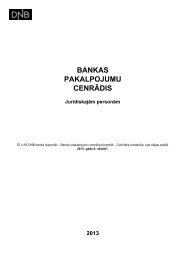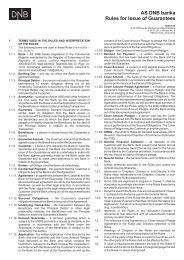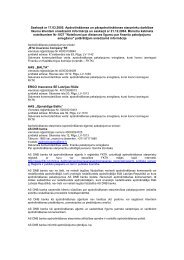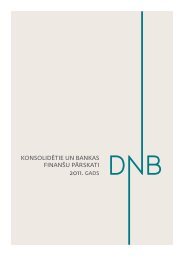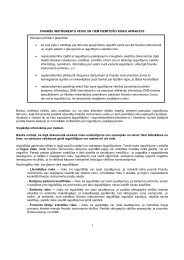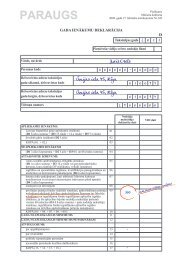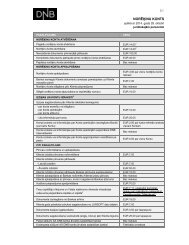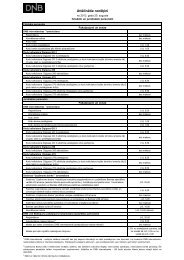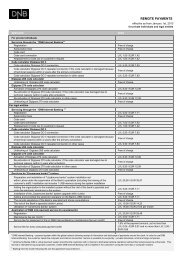Base Prospectus - Malta Financial Services Authority
Base Prospectus - Malta Financial Services Authority
Base Prospectus - Malta Financial Services Authority
You also want an ePaper? Increase the reach of your titles
YUMPU automatically turns print PDFs into web optimized ePapers that Google loves.
generally be treated as ‘‘passive category income’’ or, in the case of certain holders, ‘‘financial<br />
services category income’’ for U.S. foreign tax credit limitation purposes, and for tax years<br />
beginning after 31st December, 2006, such income will generally constitute ‘‘passive category<br />
income’’ or ‘‘general category income’’ for U.S. foreign tax credit limitation purposes. The rules<br />
relating to foreign tax credits are extremely complex and U.S. Holders should consult with their<br />
own advisers with regard to the availability of a foreign tax credit and the application of the foreign<br />
tax credit rules to their particular situation.<br />
The amount of interest on a Note denominated in a currency other than the U.S. dollar (a<br />
‘‘Non-U.S. Dollar Note’’) that must be included in income of a U.S. Holder will be the U.S. dollar<br />
value of the interest payment as at the time that such payment is accrued or received, in<br />
accordance with the U.S. Holder’s method of tax accounting. Cash basis taxpayers will include in<br />
income the U.S. dollar value of the foreign currency denominated interest payments based on the<br />
spot rate in effect on the date of receipt. Treasury Regulations provide that the exchange rate to<br />
be used for U.S. federal income tax purposes to convert foreign currency denominated interest<br />
payments into U.S. dollars for U.S. Holders that are required to accrue interest income on a Non-<br />
U.S. Dollar Note (pursuant to the OID provisions, as described below, or because the U.S. Holder<br />
uses an accrual method of accounting for U.S. federal income tax purposes) is the ‘‘average rate<br />
of exchange’’ for the period or periods during which such interest accrued unless an election is<br />
made to translate interest income at the spot rate on the last day of the interest accrual period<br />
(and in the case of an accrual period extending beyond the end of the taxable year, the spot rate<br />
on the last day of the taxable year). If the last day of an accrual period is within five business<br />
days of the date of receipt of the accrued interest, an electing U.S. Holder may translate such<br />
interest using the rate of exchange on the date of receipt. A U.S. Holder that is required to accrue<br />
interest income on a Non-U.S. Dollar Note will recognise foreign currency gain or loss, as the case<br />
may be, on the receipt of a foreign currency denominated interest payment if the exchange rate in<br />
effect on the date the payment is received differs from the exchange rate originally used by the<br />
holder to convert the payment into U.S. dollars, as described above. This foreign currency gain or<br />
loss will be treated as ordinary income or loss and not as additional interest income or loss.<br />
A U.S. Holder will have a tax basis in any foreign currency received as payment of interest<br />
on a Non-U.S. Dollar Note equal to the U.S. dollar value of such foreign currency, determined at<br />
the time of payment. Any gain or loss realised by a U.S. Holder on a sale or other disposition of<br />
the foreign currency (including its exchange for U.S. dollars or its use to purchase Non-U.S. Dollar<br />
Notes) will be ordinary income or loss and gain, if any, will generally be from sources within the<br />
United States for purposes of computing the foreign tax credit allowable under U.S. federal income<br />
tax law.<br />
Original Issue Discount<br />
Notes with a term greater than one year may be issued with OID for U.S. federal income tax<br />
purposes. Generally, OID will arise if the stated redemption price at maturity of a Note exceeds its<br />
issue price by more than a de minimis amount (generally defined as one quarter of one per cent.<br />
of the Note’s stated redemption price at maturity multiplied by the number of complete years to its<br />
maturity). For this purpose, the stated redemption price at maturity is equal to the aggregate of all<br />
payments of principal and interest required to be made over the life of the Note other than<br />
‘‘qualified stated interest’’. Only the portion of interest that is unconditionally payable at least<br />
annually at a single fixed, qualified floating or objective rate (as defined under ‘‘Floating Rate<br />
Notes’’ below) throughout the entire term of a debt instrument will be considered qualified stated<br />
interest. The issue price (the ‘‘issue price’’) of a Note is the first price at which a substantial<br />
amount of Notes of the Series of which it is a part are sold for money (disregarding sales to bond<br />
houses, brokers or similar persons). If a Note is issued with OID, a U.S. Holder of the Note will be<br />
required to include amounts in gross income for U.S. federal income tax purposes under a<br />
‘‘constant yield’’ method that will result in inclusion of amounts in income in advance of receipt of<br />
the cash payments to which such amounts are attributable regardless of such U.S. Holder’s regular<br />
method of tax accounting.<br />
An accrual basis holder of a Note which has a fixed maturity date not more than one year<br />
from the date of issue (a ‘‘Short-Term Note’’) (and certain cash method holders, as set forth in<br />
Section 1281 of the Code) generally will be required to report interest income as interest accrues<br />
on a straight-line basis over the term of each interest period. Cash basis holders of Short-Term<br />
Notes will, in general, be required to report interest income as interest is paid (or, if earlier, upon<br />
the taxable disposition of the Short-Term Note). However, a cash basis holder of a Short-Term<br />
85



